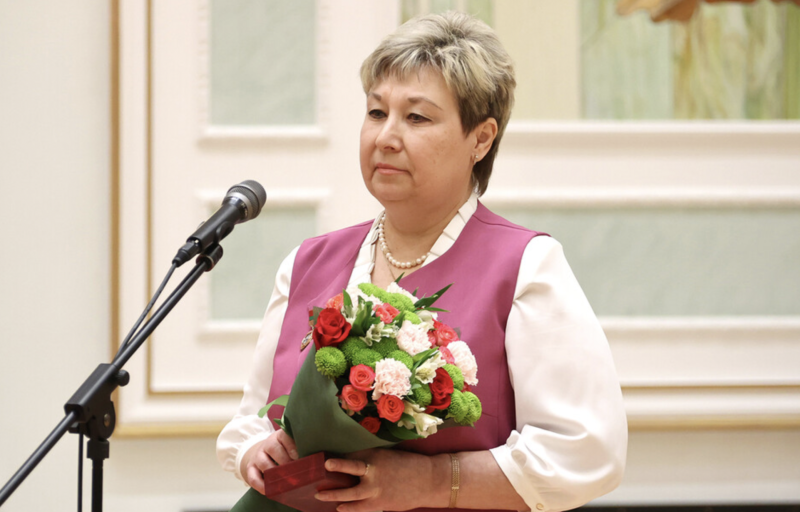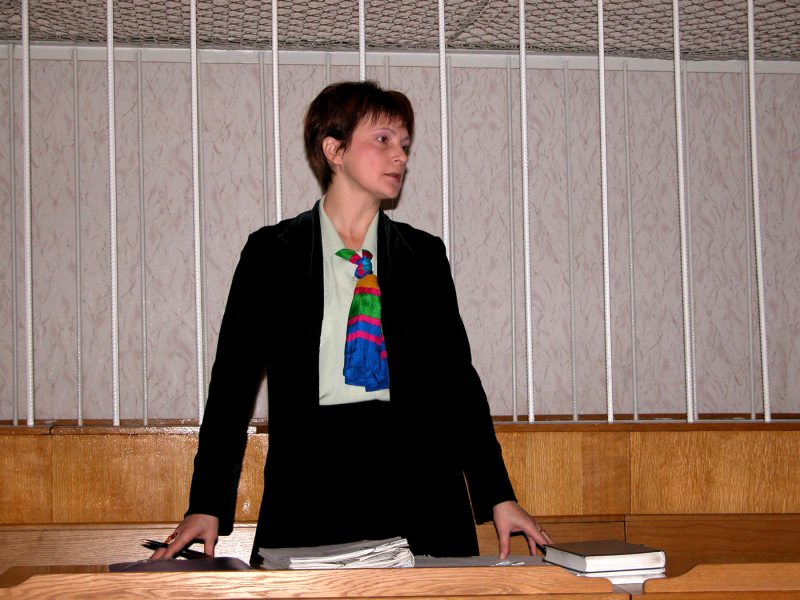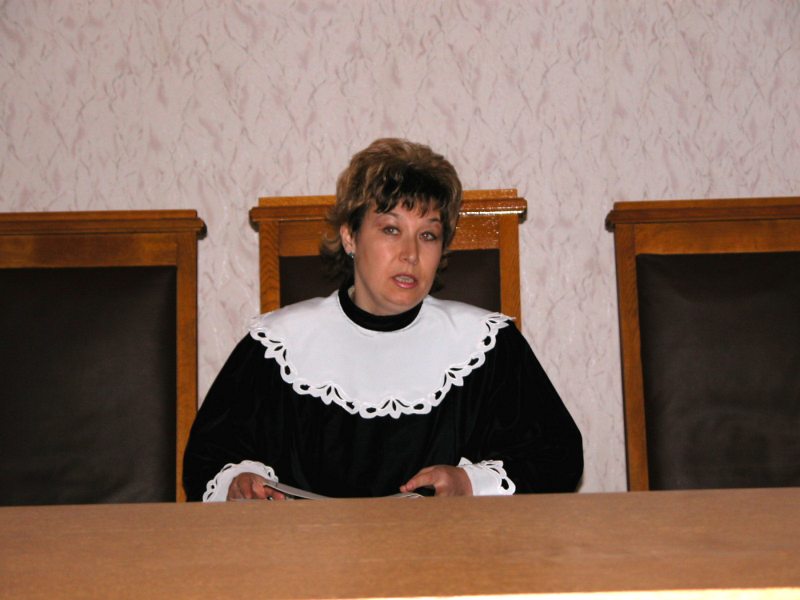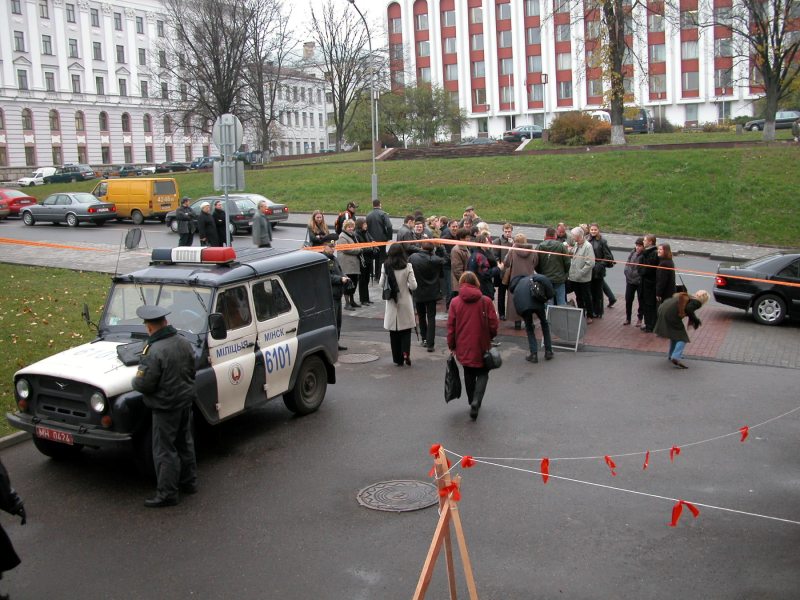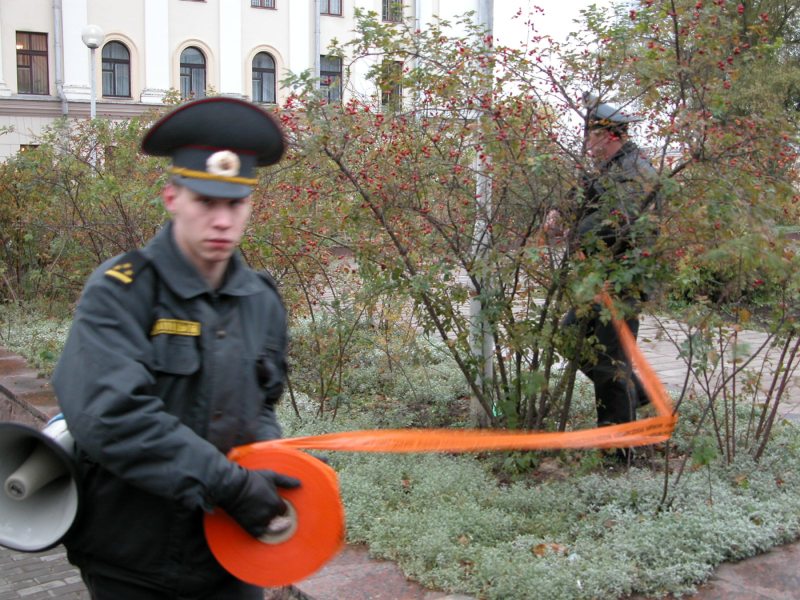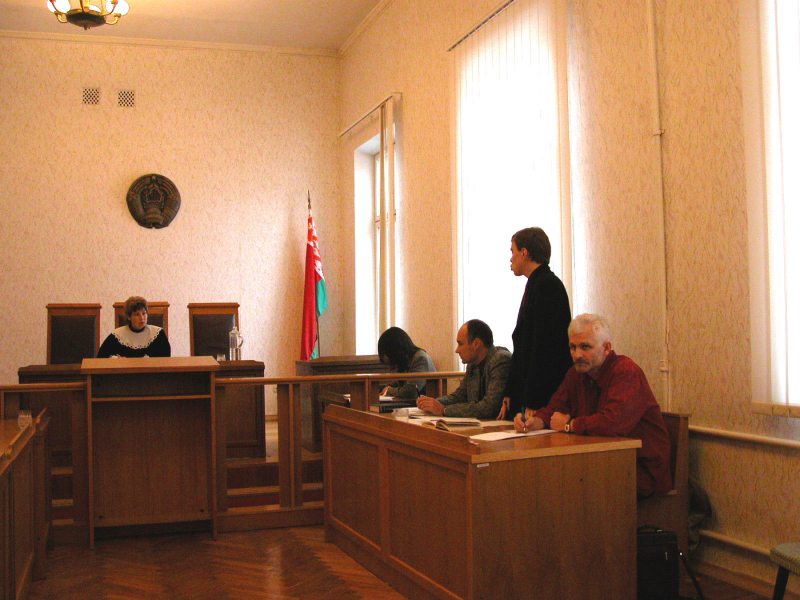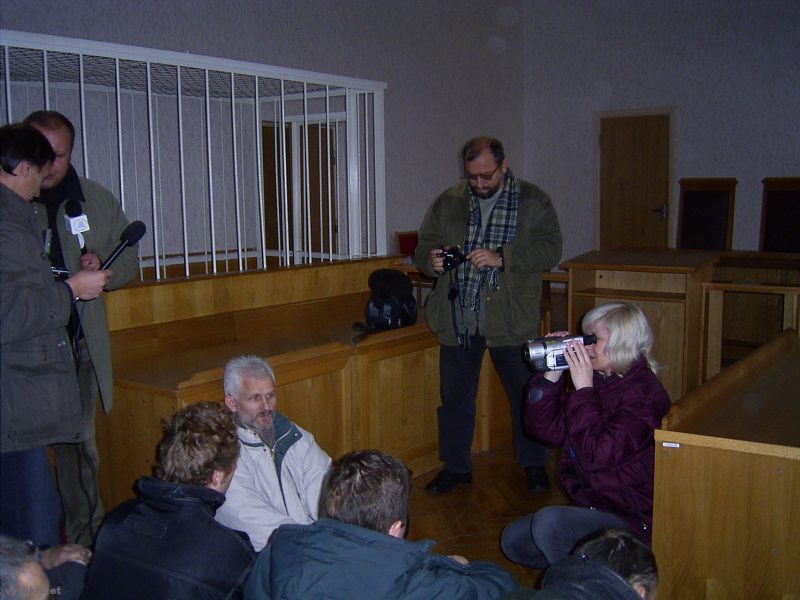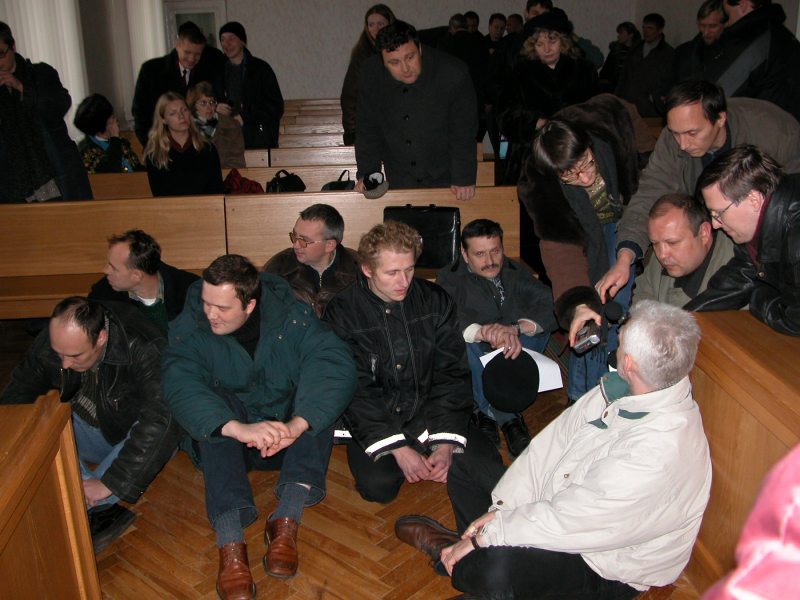"Who gave the order to destroy Viasna?” The human rights center Viasna was dissolved 20 years ago
On October 28, 2003, by a decision of the Supreme Court of the Republic of Belarus, the human rights center Viasna was deprived of state registration. After 20 years, we recall those events. The formal basis for the dissolution was a warning from the Ministry of Justice about the violation of electoral legislation by human rights defenders during the presidential elections of 2001.
The decision was then made by the judge of the Supreme Court of the Republic of Belarus Valiantsina Kulik, with the secretary Biralo M. M., with the participation of the prosecutor Davidouski I.U. In December 2021, the European Union included the judge in the sanctions list. This year, she considered a lawsuit by the Ministry of Justice on the dissolution of the opposition Conservative Christian party, the BPF.
The representative of the plaintiffs, i. e. the state, was Neanila Fishkina, then the chief specialist of the Department of Public Associations of the Ministry of Justice. At one of the meetings, she named a list of surnames that were allegedly forged in documents submitted at the time of registration of human rights center Viasna.
Why was Viasna formally deprived of registration?
In the resolution on the dissolution of the organization, it was said that the court found that the human rights center Viasna violated the requirements of the electoral legislation in the preparation and conduct of the presidential elections of the Republic of Belarus.
"In particular, during the election campaign, the public association violated the established procedure for sending observers to meetings of the election commission and to polling stations.
Thus, blank forms for extracts from the minutes of the council meeting of June 18, July 1 and 22, August 5, 2001 were sent to the Mahileu and Brest regions from the association, which were subsequently filled out arbitrarily in the name of citizens who had not been sent as observers and were not members of this public association.
In the Pastavy district, a member of the association invited citizens who were not members of either the Viasna human rights center or other public associations to observe polling stations for remuneration and filled out extracts from the minutes of the Rada meeting in their presence.
Violations of the requirements of the electoral legislation, in the opinion of the court, are gross and in accordance with Paragraph 2 of Article 57 of the Civil Code are the basis for satisfying the claim of the Ministry of Justice on the dissolution of the association," the resolution says.
Legal disputes
During the trial, Viasna chairman Ales Bialiatski spoke. Then he said that the case had a political context, and the dissolution of Viasna was not a usual case on dissolving an organization that violates Belarusian legislation or does not work and does not comply with its charter.
"Maybe because of the future parliamentary elections in 2004 and the likely referendum on changing the Constitution regarding the current term of the presidency; because of our periodic monitoring of human rights violations in Belarus; because of Viasna's outright criticism of the Belarusian authorities in relation to civil society, media, religious denominations whose rights are violated, the Ministry received a social order to destroy Viasna? Viasna that helps people and tells people the truth?
Who gave the order to destroy Viasna?
There is no need to answer, Ms. Fishkina, this is a rhetorical question to which we have an answer,” Ales Bialiatski addressed the plaintiff's representative, Neanila Fishkina.
Representatives of Viasna, who also appeared in court debates as defendants, stated that they consider the accusations of the Ministry of Justice against the organization groundless and not based on the law.
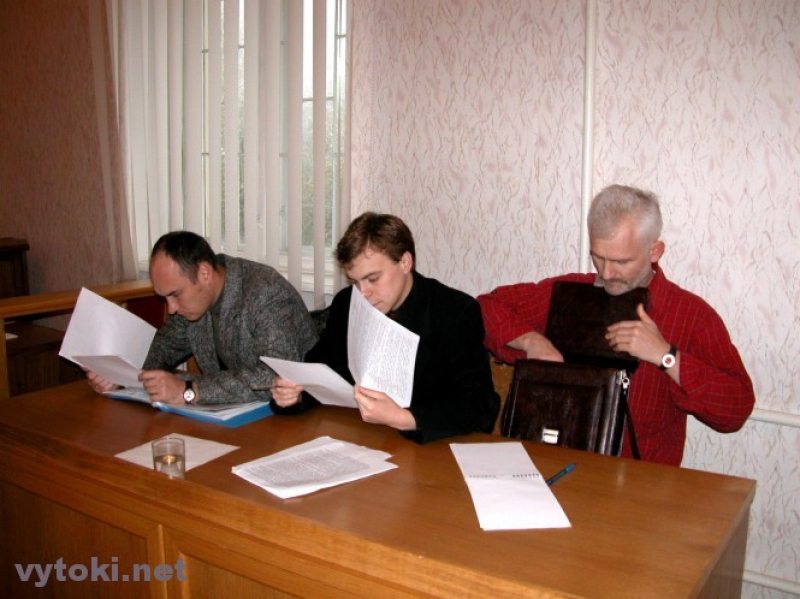
- Valiantsin Stefanovich, Uladz Labkovich, and Ales Bialiatski at the meeting on the dissolution of Viasna
Ales Bialiatski, Valiantsin Stefanovich, and Uladz Labkovich, who are currently imprisoned for their human rights activities, then consistently explained the invalidity of each of the points according to which the plaintiff wanted to deprive the organization of registration.
Protest action
Protesting the court decision, Ales Bialiatski, Uladzimir Labkovich, Valiantsin Stefanovich, Aleh Zhlutka, Uladzimir Vialichkin, Mikola Lemianouski, Zmitser Salauyou, and Aliaksei Kolchyn sat on the floor in the courtroom and began chanting "Shame!". The protest action lasted until 17.30. When it got dark, plainclothes police officers twisted the arms of the protesters, took them out through the courtyard, and delivered them to the Leninski District Police Department of Minsk, where reports were drawn up under Article 166 of the Administrative Code (disobedience to the lawful demands of police officers). The human rights defenders were issued subpoenas for October 29 and released at about 10 p.m.
Aliaksei Kolchyn, who has already been the chairman of the Mahileu branch of Viasna, also took part in the protest action (in the photo above he is the third from the left). He said that the dissolution case lasted about ten days.
"No one had any illusions, everyone understood where this was going," he recalls. "Especially then there was one of the waves of dissolution of non-governmental organizations in the country. But to be honest, no one from Viasna paid attention to the state registration, so everyone planned to go on working.
We knew that if we were dissolved, we would protest somehow. So I put on slightly warmer clothes, preparing for days in detention. What is interesting is that the story is connected specifically with the Mahileu branch, since those forms were intercepted during transportation from Minsk to Mahileu. I even felt a certain guilt at that time, although it is clear that the decision to dissolve Viasna was made on a completely different level.
When the decision was made, the courtroom exploded with shouts of "Shame!". There were many of our friends and colleagues there. We shouted together for a few minutes, and then the judge quickly left the room. We sat down on the floor, the courtroom gradually emptied, and we sat there for several hours, shouting "Shame!" every now and then until we were taken out. Each protester, arms twisted, was carried out by two hulks, holding each from the two sides. We spent a few more hours in the police department, and the next day we were fined. I remember Uladz had a little conflict with the judge during the consideration of the administrative case: she demanded that he speak Russian."
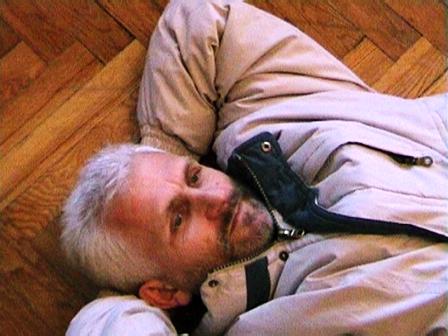
- Ales Bialiatski lies on the floor in the room of the Supreme Court in protest against the dissolution
A participant of the events, who was in the information department of Viasna at that moment, also recalls that day.
"The meeting was held in the Belarusian language. After the judge finally made the decision on dissolution, the men sat down on the floor and began shouting “Shame”; this was planned beforehand. When they were taken to a police department a few hours later, we brought them mineral water and food by taxi. I remember explaining to the driver what human rights defenders do. Of course, I had no thought of stopping my work even after that court decision.”
On August 23, 2023, the human rights center Viasna was recognized as an "extremist formation" by the decision of the Ministry of Internal Affairs. Recall that at the moment, five Viasna members remain behind bars: the chairman of Viasna and Nobel laureate Ales Bialiatski, his deputy and vice-president of FIDH Valiantsin Stefanovich, coordinator of the Human Rights Defenders for Free Elections campaign Uladzimir Labkovich, coordinator of the volunteer service Marfa Rabkova, and volunteer Andrei Chapiuk.



